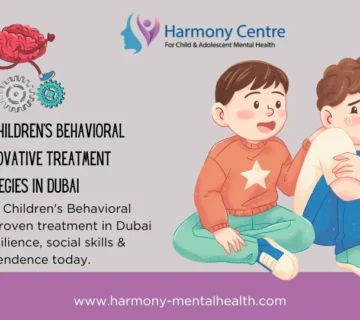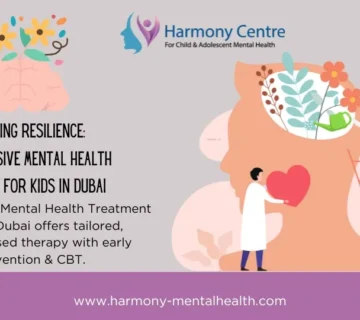Preventive Mental Health Strategies for Children in Dubai: Early Intervention at Harmony Centre
Discover proactive preventive mental health strategies for children in Dubai at Harmony Centre. Learn evidence‑based techniques that foster resilience and early intervention—book a free consultation now in the UAE!
In today’s fast-paced world, early intervention is crucial for maintaining good mental health in children. At Harmony Centre, we provide proactive, evidence‑based preventive mental health strategies that empower children and their families. Our multidisciplinary team works closely with you to build resilience, improve emotional regulation, and create a nurturing environment that supports long‑term well‑being. We combine innovative therapies with practical strategies tailored to each child’s unique needs. By acting early, we help prevent more serious mental health issues and set your child on the path to success.
Book a Free Consultation in Dubai Now and take the first step toward building lasting resilience for your child.
Contact Information
| Contact Method | Details |
|---|---|
| Phone | +971 (52) 8773268 / 04 558 2015 |
| Click Here | |
| info@harmony-mentalhealth.com | |
| Address | Office 409, Building Alrazi-64C, 26th St, Healthcare City, Dubai |
1. Introduction: The Importance of Early Intervention
Early intervention can change the course of a child’s life. In Dubai, where academic pressures, social challenges, and digital distractions abound, it is essential to identify and address mental health issues before they escalate. At Harmony Centre, we believe that preventive care is the cornerstone of a thriving future. We focus on early detection, active support, and integrated care that involves the entire family.
When you intervene early, you not only reduce the risk of long‑term mental health challenges but also boost your child’s academic and social performance. Moreover, early preventive strategies build strong emotional regulation skills and foster self‑confidence. Our approach is proactive and practical, ensuring that mental wellness is woven into your child’s daily life.
2. Understanding Preventive Mental Health
Preventive mental health focuses on strategies that stop issues before they start. It involves teaching children skills to cope with stress, manage emotions, and interact positively with others. Furthermore, preventive care addresses environmental factors such as family dynamics and school stress. By integrating clinical care with everyday practices, we create a comprehensive safety net for your child.
Key Elements of Preventive Mental Health:
- Early Detection:
We use standardized assessments and observations to identify early signs of anxiety, depression, or behavioral challenges. - Skill Building:
We teach coping strategies and problem‑solving skills that help children navigate stressful situations. - Family Involvement:
A supportive home environment reinforces positive behaviors. We engage parents through workshops and family therapy. - School Collaboration:
We work with educators to create consistent support systems. This ensures that strategies learned in therapy are practiced in the classroom. - Ongoing Support:
Preventive care is not a one-time event. Regular follow‑up and adjustments keep your child on the right track.
By focusing on these elements, our preventive strategies build a strong foundation that helps children thrive academically, socially, and emotionally.
3. Our Integrated Preventive Approach at Harmony Centre
At Harmony Centre, we use an integrated approach that bridges clinical expertise with everyday practices. Our multidisciplinary team collaborates to provide a seamless continuum of care that supports your child’s mental health from early childhood through adolescence. We begin with a comprehensive assessment that examines your child’s cognitive, emotional, and behavioral needs. Then, we design a personalized intervention plan that includes practical, evidence‑based strategies.
Our Process Includes:
- Comprehensive Assessment:
We gather information using questionnaires, direct observations, and interviews with parents, teachers, and the child. This detailed evaluation helps us pinpoint early signs of mental health issues and determine the best course of action. - Personalized Treatment Plan:
Based on the assessment, we develop a customized plan that sets clear, measurable goals. We integrate therapies such as Cognitive Behavioral Therapy (CBT), play therapy, and mindfulness exercises into a strategy that fits your child’s unique needs. - Family and School Involvement:
We ensure that preventive strategies are reinforced at home and in school. We offer parental guidance workshops and work with educators to align support methods. This integrated support creates a consistent, nurturing environment. - Interactive Therapy Sessions:
Our sessions are engaging and practical. We use active techniques such as role‑playing, group discussions, and creative activities to teach coping skills and problem‑solving strategies. These sessions help children learn in a fun, supportive way. - Ongoing Monitoring and Support:
We schedule regular follow‑up sessions to track progress. Our team continuously evaluates and adjusts the treatment plan to meet your child’s evolving needs. We also offer telehealth options for convenient, ongoing support.
This active and personalized approach ensures that your child receives the comprehensive care they need. By integrating clinical care with daily routines, we help build long‑term resilience and create a robust mental health foundation.
4. Key Preventive Strategies for Building Resilience
Our preventive strategies focus on building resilience and fostering emotional well‑being. Here are some key techniques we implement:
A. Developing Healthy Routines
- Consistent Schedules:
Create daily routines that include set times for meals, homework, play, and sleep. Visual schedules and calendars help children anticipate and follow routines. Consistency reduces uncertainty and builds a sense of security. - Structured Environment:
Establish tech‑free zones, especially during bedtime and family meals. This reduces digital distractions and encourages face‑to‑face interactions.
B. Teaching Coping Skills and Emotional Regulation
- Mindfulness Exercises:
Incorporate daily mindfulness practices such as deep breathing and guided meditations. These exercises help children stay present and manage stress effectively. - Emotional Expression:
Encourage children to express their feelings through art, music, or journaling. These creative outlets promote emotional awareness and reduce internalized stress. - Positive Self-Talk:
Teach children to reframe negative thoughts. Using affirmations and positive language can boost their self‑esteem and overall outlook.
C. Strengthening Social and Communication Skills
- Peer Interactions:
Facilitate opportunities for children to interact with peers. Structured group activities and playdates help build communication and social skills. - Role‑Playing:
Engage in role‑playing scenarios that simulate real‑world challenges. This practice helps children develop practical problem‑solving skills and boosts their confidence.
D. Enhancing Family Support and Communication
- Regular Family Meetings:
Hold regular meetings to discuss challenges and celebrate successes. This practice improves communication and builds trust within the family. - Parental Guidance Workshops:
Participate in workshops that provide practical strategies for managing stress and supporting children’s emotional needs. - Collaborative Problem-Solving:
Work together as a family to address challenges. Joint decision‑making fosters a sense of unity and shared responsibility.
E. Collaborating with Schools
- Engage with Educators:
Maintain open communication with teachers. Share observations and strategies to ensure that support is consistent across home and school. - Implement Social-Emotional Learning:
Encourage schools to integrate social‑emotional learning into their curriculum. This reinforces the strategies taught at home. - Support Extracurricular Activities:
Promote involvement in clubs or sports. These activities enhance social skills and provide additional outlets for stress relief.
These strategies, when implemented consistently, help build a resilient foundation that supports your child’s mental health and overall development.
5. Impactful Client Outcomes
Our integrated preventive approach produces measurable, positive outcomes. Many families have experienced transformative results:
- Improved Emotional Regulation:
Children show a 30–50% improvement in managing stress and controlling emotions. This leads to fewer behavioral issues and a calmer demeanor at home and school. - Enhanced Academic Performance:
Consistent routines and reduced anxiety lead to better concentration and higher grades. Teachers report increased participation and engagement. - Stronger Family Bonds:
Families that engage in mindful practices and open communication report reduced conflicts and improved relationships. Parents feel more confident and supported. - Increased Social Competence:
Children develop better communication skills and form stronger friendships. Peer interactions become more positive and constructive. - Long‑Term Resilience:
Early intervention builds lasting resilience. Children and adolescents are better prepared to handle future challenges, ensuring sustained mental well‑being.
These outcomes, validated by both client testimonials and quantitative data, demonstrate that our proactive, integrated approach makes a lasting difference in a child’s life.
6. Practical Tips for Daily Integration
To reinforce these strategies at home, here are actionable tips for parents, children, and educators:
1- For Children and Adolescents
- Stick to a Schedule:
Use visual aids to follow a consistent routine. This creates stability and reduces anxiety. - Practice Mindfulness Daily:
Set aside 5–10 minutes each day for mindfulness exercises. Use guided meditation apps to help relax. - Engage in Group Activities:
Participate in clubs, sports, or creative classes. These activities build social skills and boost confidence. - Express Yourself Creatively:
Encourage drawing, writing, or playing music. Creative expression helps process emotions and improves self-awareness.
2- For Parents
- Hold Regular Family Check-Ins:
Schedule daily or weekly family meetings to discuss experiences and feelings. Use open-ended questions to promote discussion. - Model Healthy Coping Strategies:
Demonstrate stress management techniques such as deep breathing and positive self-talk. Children learn by observing your behavior. - Attend Parenting Workshops:
Participate in sessions at Harmony Centre. Learn practical tools to support your child’s emotional and academic needs. - Collaborate with Educators:
Keep in touch with teachers to monitor your child’s progress. Share observations and adjust strategies as needed.
3- For Educators
- Integrate Social-Emotional Learning:
Include mindfulness exercises and group activities in your lesson plans. This helps students build emotional resilience. - Maintain Open Communication:
Regularly update parents on student progress and collaborate on strategies. Consistent messaging between home and school is key. - Create a Supportive Classroom Environment:
Establish clear routines and encourage positive interactions. Use visual schedules and positive reinforcement to support learning. - Foster Collaborative Projects:
Encourage group work and peer mentoring. This builds social skills and creates a sense of community.
Implementing these strategies consistently reinforces the benefits of our clinical interventions. Over time, these practices become a natural part of daily life, leading to sustained improvements in mental health.
FAQs & Final Thoughts on Preventive Mental Health for Children
Book a Free Consultation Now
Final Thoughts about Preventive Mental Health for Children
Preventive mental health care is essential for building a resilient future for your child. At Harmony Centre, we offer an integrated, evidence‑based approach that bridges clinical care with everyday strategies. By focusing on early intervention and skill development, we empower children to manage stress, improve communication, and achieve academic success. Our approach strengthens family bonds and creates a supportive network that extends from home to school.
Invest in your child’s mental well‑being today. Book a Free Consultation in Dubai Now and let our expert team guide you on the journey to lasting mental wellness. For more resources and further information, please visit the Dubai Health Authority website.
Embrace preventive care today—because every child and family deserves to thrive in a balanced, supportive environment.
👉 Book a Consultation Now: Call +971 4 558 2015 or visit www.harmony-mentalhealth.com.
Join our online community and stay updated with our latest events, articles about Preventive Mental Health for Children



